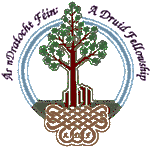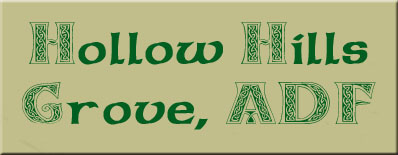Where did ADF come from?
ADF started in 1983 as a network of independent scholars interested in legitimate research about the ancient Druids and their Indo-European colleagues. It quickly grew into a new Neopagan tradition (denomination), complete with personal and group worship rituals, artistic endeavors, jokes, songs and chants, and a genuine sense of family.
When did Hollow Hills Grove, ADF start?
Hollow Hills Protogrove, ADF was formed in 2005. Our first ritual was Samhain 2005. Since then, we have had a full schedule of rituals and classes covering a variety of subjects.
We were officially recognized as a Provisionally Chartered Grove of ADF in November 2010.
We were officially recognized as a Provisionally Chartered Grove of ADF in November 2010.
What about other Druid groups?
ADF maintains friendly relations with the fraternal ("Meso-pagan" or mixed Christian/Pagan) Druid orders in England and elsewhere, as well as with the handful of other Neopagan Druid groups. We encourage our members to investigate these other organizations and to learn as much as they can about alternate paths of Druidism. We are, however, quick to expose groups and individuals we believe to be fraudulent or dangerous, even though such vigilance may be controversial.
Is ADF Wiccan?
About three-quarters of our membership are or have been followers of Wicca, including a sizable number of Wiccan priests and priestesses who are using our Study Program to improve their clergy skills. The primary differences between Druidism and Wicca are these: Druidism is polytheistic, large-group oriented, and public. Wicca is duotheistic, small-group oriented, and private. Nonetheless, the two religions have far more in common than they have separating. Wiccan covens can (and do) function as special interest groups within larger ADF groves, along with bardic, healing, ecological, divinitory, and other groups.
Didn't the ancient Druids do human sacrifice?
Yes, it's true. But then, so did the clergy of almost every other religion in human history, including the monotheistic ones. Neopagan Druids do not practice human or animal sacrifice in our rituals. Instead we offer the Goddesses and Gods flowers, fruits, wine, incense, music, song, drama, prayer, and -- most important of all -- our love. The deities seem to find it more than sufficient.
What are the Druid holidays?
We celebrate the turning of the Wheel of the Year by observing eight "High Days" -- the solstices and the equinoxes, as well as the halfway points between which were originally the great fire festivals of our European predecessors). Due to our calendrical researches, we often celebrate the Major High Days a few days after other Neopagans do. Some groves also celebrate the various phases of the moon, or the beginnings and endings of various hunting, fishing, and agricultural seasons.
What exactly is an ADF grove?
An ADF grove is any group of three or more voting members of ADF over the age of 18, who live in the same general geographical area, who gather together at least twice a month to study and practice Druidism within the context of �r nDra�ocht F�in, and who are chartered by the Mother Grove (the Board of Directors) of ADF as a local congregation. An ADF grove provides open worship ceremonies for all eight High Days, study groups for various Druidic arts and sciences, fellowship, hard work, and lots of fun. Almost any member of ADF can plant a "Grove" just by asking.
What are Lore and Arts meetings?
Lore meetings are meetings in which we learn about a particular Indo-European Culture, Gods and Goddesses (through historical interpretation as well as guided meditation) and any number of subjects related to Druidry, ADF, or neo-paganism.
Arts meetings are meetings in which we learn a skill or an art or a craft.
If a class is particularly popular it may be repeated.
What kinds of subjects have been covered in Lore/Arts Meetings of the past?
Lore Meetings: In the past we have discussed Holy Wells of Britain and Ireland, Animals in Celtic Mythology, labyrinths, tarot, Sacred Geometry, ADF cosmology and liturgy, and information on the Gods including Apollo, the Morrighan, Silvanus, Brighid, Hekate, Angus Og, and others.
Arts Meetings: In the past we have made Brighid's Crosses, incense and smudge sticks with other arts and crafts classes being planned.
Why do we have a praise offerings section of our ritual?
During our rituals there is generally a time when attendees can make personal praise offerings, or thanks to the Powers for blessings received. These offerings may be given to any among the Indo-European Kindred (Ancestors, Deities and Nature Spirits).
This is not mandatory for attendees, praise is freely given and nothing is asked for in return.
What are considered appropriate offerings? What aren't?
Some offerings given in the past are performed songs and stories, hand made items put into the fire, silver for the well (small silver beads, rings, other pieces of silver, crystals, shells and other stones), fresh flowers, bread, honey, butter, incense, olive oil, fruit, whiskey, beer, etc. The sacrifices/praise offerings DO NOT include blood sacrifices of any kind. Biodegradable and items that are non-toxic when burnt are always appreciated.
We ask that you not applaud the Praise Offerings, rather give the energy of your appreciation to the Patrons.
What happens to the silver and stones put into the well?
A ritual pond is about to be built at our ritual site and the items will be deposited there. Also, we may also consider taking these offerings to another offering place, such as a holy well or stream that accepts offerings, and deposit them there.
What kinds of training do you have for newcomers?
ADF has several training systems and you must be a member of ADF to participate. The Dedicant Path is prerequisite to other ADF training and is a year-long introduction to the beliefs and practices of Our Druidry. The Initiate Program is built around more experiential skills of personal ritual, magic, divination, and trancework. The Generalist Study Program is a core set of courses which complements Guild training, allowing students to learn specific skills of interest. The Guild Study Programs bring in specialized training in such things as scholarship and bardic studies, as well as artistic and liturgical skills. The Clergy Training Program is now open for students that have completed our Dedicant Path.
Hollow Hills Grove also has its own classes and arts meetings.
Is ADF/Hollow Hills Grove an initiatory tradition?
Not in the same way that Wicca is an initiatory tradition. Most of our training is self study, but mentors can be available and some Groves have regular meetings to enable members to complete the Dedcant Path. For information on initiation see the article Some Notes on Initiation on the ADF website at:
http://www.adf.org/rituals/explanations/initnote.html
Why don't you cast a circle?
In ADF we do not cast circles as Wiccans do in their rituals. Circles are used as protection and to keep unwanted influences out. From the ADF website:
Often this is because the main part of the ritual is some form of focused magical working and these undesirable forces could work against the participants doing the magic. In ADF, our main focus is not magical work, it is religious offerings ("sacrifices"), so there is much less emphasis on needing to keep undesirable forces "out" since our focus is much more on inviting our gods and spirits "in".
We build energy and create a sacred space in other ways. We give offerings to the Outsiders or Outdwellers (entities who may disrupt the ritual or whose workings are not in line with our workings), we open the Gates to the Otherworld, and we also create a Sacred Centre with the fire, the well and the tree.
People are free to come and go from the ritual site as they please and won't have to have a gate "cut" in the circle to leave.


